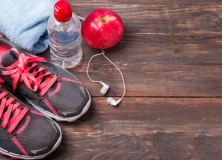Wait right there! Thinking of skipping past this article because you don’t exactly consider yourself an athlete? Well, when it comes to iron deficiency in athletes, you don’t need to be a professional athlete or out running regular marathons, recreational athletes should know about the possible risks too.
Iron deficiency in athletes is a bit of a controversial topic. Exercise increases red blood cell production (which increases iron requirements) and sweating causes some iron loss, making it understandable to think that the risk of iron deficiency in athletes is a cause for concern. The controversy comes from the lack of literature to actually confirm that athletes are at a higher risk of true iron deficiency than the general public.
Iron plays a large role in your physical activity, and knowing what it does can help you stay healthy while you work on your fitness goals.
What You Need to Know About Iron & Exercise
Iron helps carry oxygen throughout the body, including to your muscles and organs. Not having enough iron can make you feel sluggish and fatigued, which as you can imagine, can impede your performance and endurance, and possibly derail your attempts at becoming more active or a better athlete.
Athletes (both professional and recreational) often don’t get enough dietary iron because of low-calorie diets (below 2000 calories). If you’re just starting to exercise as a part of your resolution to make 2015 the year you get fit/fitter, then chances are that too have also considered a change in diet to go along with your exercise plan. This is not to say that you shouldn’t opt for a healthier diet, just remember that in order to keep your body functioning at its best, and to be able to get the energy you need to work out, getting enough iron is crucial! It’s also worth mentioning that vegetarians, athletes or otherwise, increase their risk of iron deficiency due to the lack of animal products in their diets.
Ladies and Adolescents: You ARE at Risk
Female and adolescent athletes have a higher risk of developing iron deficiency anemia. Females of childbearing age have an increased risk even if they’ve never worked out a day in their lives simply because of the iron lost during menstruation. A study published online in 2013 checked iron levels before training and during the recovery phase. The study found that 50% of the female participants were already iron deficient upon beginning the study, which increased to 71% when checked again during the recovery phase.
Adolescents are in the high-risk group because of the increased need for iron during rapid growth spurts and not getting enough dietary iron to keep up with their growing bodies. Pregnant women should also be aware of their increasing need for iron throughout pregnancy.
Are You Feeling the Effects of Iron Deficiency?
As an athlete, you may notice the effects of iron deficiency sooner than a non-athlete![]() because of the effect it will have on your performance. Not having enough iron to supply oxygen to your muscles and other tissues may leave you feeling:
because of the effect it will have on your performance. Not having enough iron to supply oxygen to your muscles and other tissues may leave you feeling:
- Fatigued
- Irritable
- Short of breath
You may also experience headaches and feel rundown. Learn more about the signs and symptoms of iron deficiency and use this Symptoms Checker to identify your symptoms.
What to Do About It
Preventing iron deficiency and replenishing iron stores if you are already iron deficient will require some combination of adding foods rich in iron to your diet and taking an oral iron supplement. Consult your doctor or pharmacist for more information on what supplement is best for you.
Here is a guide to helping you choose the best iron supplement →
If you’re feeling too tired to work out or just don’t seem to be able to exercise at 100%, have your doctor check for iron deficiency. When talking with your physician (especially if you are a female athlete), it is important to routinely cite iron status as your primary nutritional concern.
Here are 4 things you should discuss with your doctor if you suspect iron deficiency →
Content and advice provided on The Iron Maiden is for information purposes only and should not serve as a substitute for a licensed health care provider, who is knowledgeable about an individual’s unique health care needs


